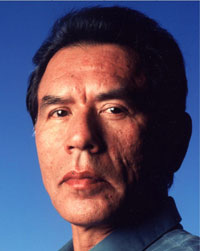|
| ||
| ‘A tool for storytelling’
by Stew Mosberg On screen, Wes Studi’s dark, intense eyes seem to pierce right through to your soul. In person, he projects a much less menacing personality. In fact, off-screen Studi speaks with candor, is warm and friendly, self-deprecating, and quick to laugh. Perhaps best known for his exceptional performance as “Magua,” the fierce nemesis in “Last of the Mohicans” (1992), Studi has appeared in dozens of other films and television productions. The actor portrayed a Pawnee warrior in “Dances with Wolves;” played “Geronimo: An American Legend;” and appeared in “Mystery Men” as the Sphinx and as Detective Casals opposite Al Pacino in “Heat.” Most recently, he starred in “Trail of Tears” and will soon be seen in James Cameron’s “Avatar,” to be released this December. Studi, a full-blood Cherokee, was born on the outskirts of Talequah, Okla., and now lives in Santa Fe. An acclaimed actor for more than 20 years, he is also a musician, author and sculptor who works to keep his native language alive. Last Thursday, Studi was in Durango as guest lecturer in Fort Lewis College’s Native American Presidential Lecture Series. Prior to the presentation, he spent the day with Native American students and faculty members and discussed what he jokingly referred to as, “My favorite subject ...Wes Studi.” During a pre-lunch gathering, he shared details of his life as an actor, as a Cherokee, and as a family man. When asked about his involvement with tribal affairs or if he practiced the traditional ways of his people, the multi-talented Studi admitted that he doesn’t religiously practice tribal traditions, but, “It is a mindset that guides me in my daily life,” he said. “I’m a tool,” he laughingly continued, “for storytelling; stories that make a difference, that bring a thread from the past.” What he has learned most from his Cherokee heritage is, “to treat others the way you wish to be treated.” When asked about his start in the film business and being type-cast as an Indian, he joked about Hollywood’s original “leather and feathers” mentality, but credited Chief Dan George and Will Sampson as the Indian actors who began the movement away from stereotyping. More than a few of those present inquired about the film industry and if Studi thought changes might ever occur regarding distribution and production of Native American-themed motion pictures. In response, Studi remarked that new tribal wealth from casino ownership could be a key factor, “It’s (casinos) the entertainment business, isn’t it? Why not use some of the earnings to get our films out there?” Later in the evening, people lined up outside the Community Concert Hall before the doors opened and ultimately filled it to the rafters. All three tiers held a wide-ranging audience of all ages and races. During the introduction, the crowd applauded the mention of his more notable films and continued clapping for several minutes following his walk on stage. Perhaps it was the size of the crowd that surprised him, but Studi seemed a little nervous at first, removing his black leather sport jacket, and soon afterward, the silk scarf from around his neck. Obviously a showman, warming to the hoots and hollers and thunderous applause, he strutted on the floor boards while he himself applauded the audience, until ultimately taking a seat center stage in a large arm chair. Studi told of his early years in Oklahoma and described his schooling and then hesitatingly touched on his experience as a combatant in Vietnam. Not long after his discharge, he returned to the reservation and began to realize that he, like many others, had forgotten his heritage. “We began to forget who we were,” he remarked, “and where we came from; about the Trail of Tears,” a reference to the forced relocation of the Cherokee from Georgia to Oklahoma. Taking advantage of the GI bill, Studi enrolled in junior college and began to research Cherokee influence and background. At one point in his talk, Studi paused to look into the audience and expressed his admiration of the Native American youth for seeking an education, “I applaud you for that,” he said. He also spoke of the poverty he experienced as a child and how much things had changed for him. Studi then encouraged the young people in the audience to experience and learn as much as they could so that they, too, could find their passion. When asked what his greatest challenge has been, Studi didn’t hesitate, “My greatest challenge was myself, my fear of failure. It is one challenge I so much enjoyed overcoming. On stage is where I overcame it.” •
|
In this week's issue...
- May 15, 2025
- End of the trail
Despite tariff pause, Colorado bike company can’t hang on through supply chain chaos
- May 8, 2025
- Shared pain
Dismal trend highlights need to cut usage in Upper Basin, too
- April 24, 2025
- A tale of two bills
Nuclear gets all the hype, but optimizing infrastructure will have bigger impact


